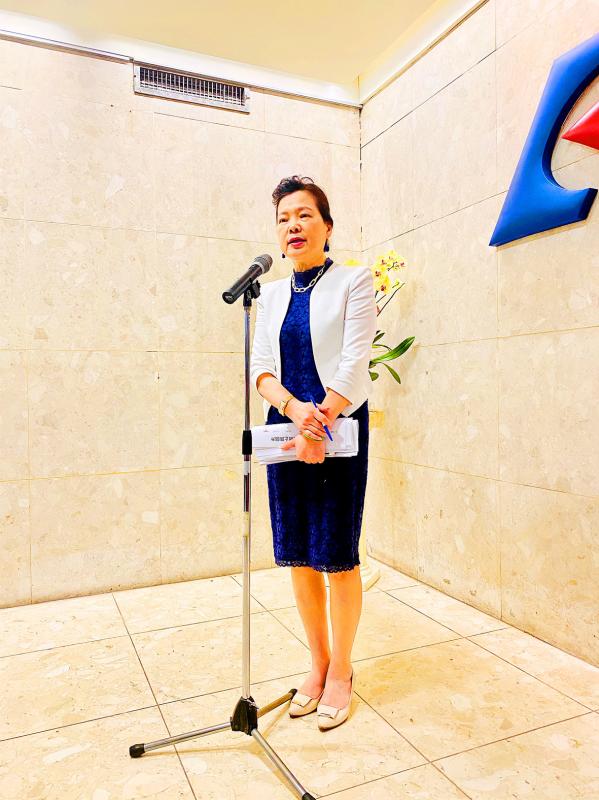The Ministry of Economic Affairs (MOEA) yesterday said that it hopes to begin accepting applications next month from the manufacturing and exhibition industries for the government’s “Stimulus 3.0” program.
The ministry is keenly aware that many traditional manufacturers, as well as the shows and exhibition industries, are in urgent need of relief amid a COVID-19 pandemic slowdown, Minister of Economic Affairs Wang Mei-hua (王美花) told reporters.
The ministry has already asked the Executive Yuan for funding, Wang said.

Photo: Huang Pei-chun, Taipei Times
“We are waiting right now, but we expect approval within days so that we can start processing the relief,” she said.
When asked about a possible time frame, she said that the ministry is aiming for “early to mid-September.”
“We will make an announcement as soon as the approval is given,” Wang said.
The budget request pending approval anticipates third and fourth-quarter needs for this year, Wang said.
The ministry is seeking NT$20 billion (US$677.74 million) for each quarter, she said.
Last month’s data showed that the retail and the food and beverage sectors have recovered well, Wang said.
The stimulus program is to help businesses still down by more than 50 percent year-on-year, she added.
The government spent NT$200 billion in the Stimulus 2.0 program to help virus-stricken businesses, but the funds ran out in the middle of last month so that program was ended early, Wang said.
When asked about the ministry tightening rules against Chinese business interests, Wang said that in addition to more regulation of Chinese firms investing in Taiwan, the ministry is also clarifying statutes governing information transfer to China.
“After our clarification, any skill transfers or licensing agreements that are technical in nature must be approved by the ministry,” Wang said.
There are no further plans to expel companies that are backed by Chinese capital, despite the Investment Commission ruling that Taobao Taiwan (淘寶台灣) is a Chinese company, she said.

When an apartment comes up for rent in Germany’s big cities, hundreds of prospective tenants often queue down the street to view it, but the acute shortage of affordable housing is getting scant attention ahead of today’s snap general election. “Housing is one of the main problems for people, but nobody talks about it, nobody takes it seriously,” said Andreas Ibel, president of Build Europe, an association representing housing developers. Migration and the sluggish economy top the list of voters’ concerns, but analysts say housing policy fails to break through as returns on investment take time to register, making the

‘SILVER LINING’: Although the news caused TSMC to fall on the local market, an analyst said that as tariffs are not set to go into effect until April, there is still time for negotiations US President Donald Trump on Tuesday said that he would likely impose tariffs on semiconductor, automobile and pharmaceutical imports of about 25 percent, with an announcement coming as soon as April 2 in a move that would represent a dramatic widening of the US leader’s trade war. “I probably will tell you that on April 2, but it’ll be in the neighborhood of 25 percent,” Trump told reporters at his Mar-a-Lago club when asked about his plan for auto tariffs. Asked about similar levies on pharmaceutical drugs and semiconductors, the president said that “it’ll be 25 percent and higher, and it’ll

CHIP BOOM: Revenue for the semiconductor industry is set to reach US$1 trillion by 2032, opening up opportunities for the chip pacakging and testing company, it said ASE Technology Holding Co (日月光投控), the world’s largest provider of outsourced semiconductor assembly and test (OSAT) services, yesterday launched a new advanced manufacturing facility in Penang, Malaysia, aiming to meet growing demand for emerging technologies such as generative artificial intelligence (AI) applications. The US$300 million facility is a critical step in expanding ASE’s global footprint, offering an alternative for customers from the US, Europe, Japan, South Korea and China to assemble and test chips outside of Taiwan amid efforts to diversify supply chains. The plant, the company’s fifth in Malaysia, is part of a strategic expansion plan that would more than triple

Taiwanese artificial intelligence (AI) server makers are expected to make major investments in Texas in May after US President Donald Trump’s first 100 days in office and amid his rising tariff threats, Taiwan Electrical and Electronic Manufacturers’ Association (TEEMA, 台灣電子電機公會) chairman Richard Lee (李詩欽) said yesterday. The association led a delegation of seven AI server manufacturers to Washington, as well as the US states of California, Texas and New Mexico, to discuss land and tax issues, as Taiwanese firms speed up their production plans in the US with many of them seeing Texas as their top option for investment, Lee said. The